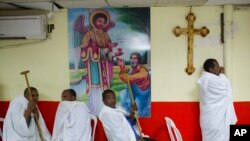The U.N. refugee agency is appealing to the government of Israel not to forcibly send thousands of Eritrean and Sudanese refugees or asylum seekers to other countries in sub-Saharan Africa.
The U.N. refugee agency says Israel's policy has been in place since 2016, but Israel generally has not applied it; however, UNHCR spokesman William Spindler says Israel’s plans, announced January 1, to forcibly relocate Eritreans and Sudanese to countries in Africa or have them face indefinite detention, are of great concern.
“Official statements that the plans may eventually target families and those with pending asylum claims, or that asylum seekers might be taken to the airport in handcuffs, are particularly alarming…Forced relocation to countries that do not offer effective protection and the onward movement of these people to Libya and Europe is particularly worrisome,” Spindler said.
An estimated 27,000 Eritreans and 7,700 Sudanese are currently in Israel. Since the government took over the screening process from the UNHCR in 2009, only 10 Eritreans and one Sudanese have been recognized as refugees.
Between November 2015 and December 2017, UNHCR staff in Rome interviewed 80 Eritrean refugees or asylum seekers -- all had been forcibly relocated by Israel. Spindler says their cases demonstrate the dangers of this policy.
“Most said they had been transferred from Israel to a country in Africa and provided with a lump sum of U.S. $3,500; however, the situation on arrival was different to what most had expected and with little further support provided beyond accommodation on the first night. They reported feeling unsafe, as they were known to have money,” Spindler said.
Spindler says all the Eritreans report they had entered Israel via the Sinai and suffered torture, mistreatment and extortion on their way. He says the UNHCR is ready to help Israel find alternate solutions, such as legal resettlement to another country to ensure the protection of the asylum seekers.
The Africans who have crossed into Israel describe themselves as refugees seeking political asylum, but Israel sees the majority as illegal economic migrants and even “infiltrators.”




